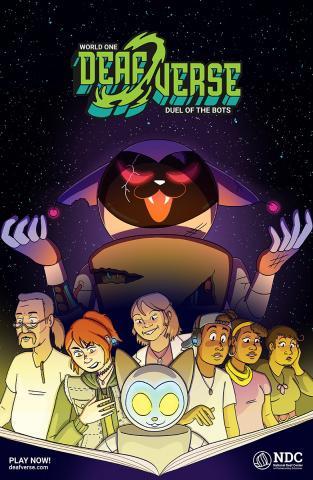The Deafverse team is happy to report that Deafverse has more than 5,000 players signed up and learning how to get through challenging situations by advocating for themselves. Deafverse has also been featured in the news multiple times!
Alcade, the official alumni magazine of the University of Texas, began their article on Deafverse with this fantastic quote:
“Video games have come a long way since the ‘80s… But all in that time, there has never been an American Sign Language accessible video game. Until now.”
Ars Technica, The Daily Moth, KXAN, and The Daily Texan are all other outlets that have featured Deafverse. @DidYouKnowThatASL has also interviewed our Gaming Coordinator, Kent Turner, on Instagram!
We designed Deafverse to teach students important life skills by using immersive storytelling to simulate different situations that appear in deaf people’s lives.
“The player begins the game escaping from a mysterious organization who is trying to learn about the Deafverse — which is a collection of ancient, magical comic books,” said KXAN’s Alyssa Goard. “Next, the player enters these comic books, both trying to stop a rogue bot and also making choices in scenarios similar to those deaf teens would have to make in real life.”
The goal of Deafverse is to enable players in taking insights from the game and applying them to real life.
The narrator of Deafverse, Justin Perez, told The Daily Moth “I can become more comfortable with answering certain questions or solving certain situations or feel comfortable taking risks… With these skills, we can go back to the real world where it can be tough, but you’d have the tools to recover and respond by seeking out resources, resolutions, some kind of help and numerous other resources.”
Kent Turner, Gaming Coordinator, added to Justin’s points in a separate interview with The Daily Texan.
“The game teaches deaf people to know their rights,” Kent said. “They have a right to an interpreter and different accommodations in school. Some deaf students don’t know about these accommodations, so we developed this game for deaf students to learn how to manage their lives.”
While Deafverse is focused on deaf teens, the game was built with accessibility in mind, so it is available to people with a wide range of abilities. Those who don’t know American Sign Language have reported to us that they enjoy the visual experience that Deafverse presents!
Here’s a quote by Ars Technica’s Anthony McGlynn on accessibility in the game:
“… Deafverse is serving as a benchmark of sorts for overall accessibility within the games industry. While standards are much better than they were, there’s still a lot of room for improvement, not least in basic aspects like uniformity among subtitling and options available.”
The game was made possible by support from the US Department of Education’s Office of Special Education Programs.

